Insight Blog
Agility’s perspectives on transforming the employee's experience throughout remote transformation using connected enterprise tools.
25 minutes reading time
(5091 words)
Business Intranets That Your Employees Will Love: 15 To Choose From in 2025
Find the best business intranets for your business in 2025. Learn about software options, advantages, and applications to improve operations and collaboration.
Discover the perfect business intranet solution for your company with our comprehensive guide. We've researched and analyzed the best intranet software for small business options, including a cloud-based intranet for small businesses, open-source alternatives, and even free intranet software for small businesses.
From the advantages of intranet in business to detailed business intranet examples, we'll help you navigate the landscape of small business intranet solutions and make an informed decision.
Whether you're looking for a simple, intuitive platform or a robust, feature-rich business intranet system, our guide has you covered.
So, dive in and explore the potential of the business intranet to transform your internal communications and collaboration today.
Key Takeaways
- Business intranet plays a crucial role in business operations, fostering effective communication, collaboration, and streamlined processes.
- Businesses can choose from various business intranet solutions, including cloud-based, free, open-source, and social intranet options, to suit their specific needs.
- AgilityPortal, Slack, and Yammer are some of our top business intranet or company intranet solutions picks.
- Business intranet security and maintenance are essential for protecting sensitive business information and ensuring optimal performance.
- Businesses can leverage business intranet solutions for various applications, including enhancing collaboration, productivity, and communication within the organization.
What is Business Intranet?
A business intranet is a private, secure network within a company that facilitates internal communication, collaboration, and knowledge sharing among employees. It serves as a central hub for vital business information, resources, and applications, streamlining day-to-day operations and fostering a connected work environment.
Importance of Business Intranet in Small Business Operations
The importance of intranet in business, particularly for small businesses, cannot be overstated. Implementing an effective intranet for small businesses provides numerous advantages. For one, it encourages real-time collaboration and communication, enabling employees to work together more efficiently. This increased collaboration can lead to faster problem-solving, improved productivity, and a more cohesive team.
Furthermore, a small business intranet helps keep important information and resources organized and easily accessible. Employees can quickly find the documents, policies, and tools they need, reducing the time spent searching for information and ultimately increasing overall efficiency.
Intranet software for small businesses is available in various forms, including a cloud-based intranet for small businesses and open-source intranet software for small businesses. These options cater to different needs and budgets, making it possible for companies to choose the most suitable solution.
Integrating a business intranet can also enhance employee engagement by providing a platform for social interaction and promoting a sense of belonging within the organization. A social intranet for small businesses allows employees to share ideas, celebrate successes, and stay informed about company news and events.
Creating a Business Intranet for Small Business
Creating an intranet for small businesses can greatly enhance your organization's communication, collaboration, and efficiency. By implementing a centralized platform, you can streamline your business processes and foster a connected work environment. To create a successful small business intranet, you need to follow a few essential steps and consider several factors, such as the best intranet software for small businesses and integration with existing tools.
Steps to creating an intranet for a small business
- Define your objectives: Before you start building your intranet, it's essential to define the objectives and goals you want to achieve. Consider how an intranet can address your business needs and improve overall efficiency.
- Choose the right intranet software: Research various intranet software for small business options and select one that fits your organization's unique requirements. Consider factors such as ease of use, scalability, and integration with existing tools.
- Plan your intranet structure: Design a clear and organized structure for your intranet that includes sections for company news, documents, employee profiles, and team collaboration.
- Develop content and resources: Populate your intranet with valuable content and resources that your employees will find useful. This might include company policies, training materials, and project documentation.
- Implement access controls: Ensure that your business intranet is secure by implementing proper access controls and permissions for different user groups.
- Train your employees: To ensure successful adoption, provide training and support to your employees on how to use the intranet effectively.
- Monitor and improve: Regularly evaluate the performance of your intranet, gather user feedback, and make improvements as needed. This will help ensure that your small business intranet remains relevant and valuable to your organization.
Factors to consider when choosing business intranet software
- When choosing the right intranet software for your organization, there are several factors to consider. The following factors will help guide you in selecting the best solution for your business needs:
- Ease of use: The ideal business intranet should be user-friendly and intuitive, making it easy for employees to navigate and locate information. A complex or confusing interface can lead to reduced productivity and user adoption.
- Scalability: As your organization grows, your intranet software should be able to scale with it. Make sure the solution you choose can handle increasing users, content, and features without sacrificing performance.
- Customizability: Different organizations have different needs, so it's important to find an intranet solution that can be customized to fit your specific requirements. This may include branding, content organization, and other tools and systems integration.
- Integration: The intranet software should integrate seamlessly with the tools and systems your organization already uses. This could include email, document management systems, project management tools, and customer relationship management (CRM) software.
- Security: A business intranet should have robust security features to protect sensitive company information. This might include data encryption, user authentication, and access controls. Look for an intranet solution that adheres to industry security standards and provides regular updates to address emerging threats.
- Collaboration features: The primary goal of an intranet for business is to facilitate communication and collaboration among employees. Make sure the solution you choose offers a variety of collaboration tools, such as file sharing, instant messaging, and discussion forums. It's also beneficial if the platform supports real-time collaboration, allowing team members to work on documents and projects simultaneously.
- Mobile accessibility: With the increasing popularity of remote work, it's essential to select an intranet software that is accessible from a variety of devices, including smartphones and tablets. This will enable your employees to access important information and collaborate on projects from anywhere, at any time.
- Analytics and reporting: Tracking the performance of your business intranet is crucial for optimizing its effectiveness. Look for a solution that offers built-in analytics and reporting features, allowing you to monitor user engagement, content popularity, and other key metrics.
- Support and training: Implementing a new intranet solution can be a complex process, so it's important to choose a provider that offers comprehensive support and training. This should include technical support, onboarding assistance, and access to resources like user guides and tutorials.
- Cost: Finally, consider the cost of the intranet software. This includes the initial investment and ongoing expenses such as maintenance, upgrades, and licensing fees. Be sure to compare the total cost of ownership (TCO) for different solutions and factor in potential cost savings from increased productivity and efficiency.
Types of Business Intranet Solutions for Small Business
There are various types of intranet solutions for small businesses available in the market, each with its own unique features and benefits. In this article, we will explore four popular options: cloud-based intranet for small businesses, free intranet software for small businesses, open-source intranet software for small businesses, and social intranet for small businesses. Here are a few intranet software examples>
Employee intranet examples: AgilityPortal is the best intranet software for all your communication and collaboration needs. The workplace is changing. Try a 14 days free trial now
#1. Cloud-based Business Intranet for Small Business
Cloud-based business intranet solutions are hosted on remote servers and can be accessed online. These solutions offer several advantages: lower upfront costs, easy scalability, and automatic updates. With a cloud-based intranet, small businesses can focus on their core operations without worrying about managing the IT infrastructure required for an on-premise solution. Some popular cloud-based intranet providers include AgilityPortal, SharePoint, Google Workspace, and Happeo.
#2. Free Business Intranet Software for Small Business
As the name suggests, these business intranet solutions are available at no cost. These options can be a great starting point for small businesses with limited budgets, as they typically offer basic functionality and collaboration tools. However, it's essential to consider that free solutions may have limitations regarding features, scalability, and support. Some popular free intranet software includes Bitrix24, Zoho Connect, and Samepage. Moreover, you can also use free trials on business intranets like AgilityPortal.
#3. Open-source Business Intranet Software for Small businesses
Open-source business intranet software allows small businesses to customize and modify the source code according to their unique requirements. These solutions typically come with a strong community of developers and users contributing to the software's ongoing development and improvement. While open-source intranet software can offer more control and customization options, implementing and maintaining it may require more technical expertise. Some popular open-source intranet software options include HumHub, eXo Platform, and Plone.
#4. Social Business Intranet for Small Businesses
Social business intranets are designed to facilitate collaboration and communication within the organization by incorporating social networking features. These solutions often include features such as activity feeds, discussion forums, and social media-style profiles, enabling employees to interact and engage with one another in real time. Social intranets can help foster a sense of community and improve knowledge sharing within the organization, increasing productivity and employee satisfaction. Examples of social intranet platforms include AgilityPortal, Jive, Workplace by Facebook, and Yammer.
Top Business Intranets Comparison: Which one is right for you?
#1. AgilityPortal
If you're looking for a business intranet solution that can help improve communication and collaboration among employees and teams, look no further than AgilityPortal. This powerful software offers a range of features and benefits, including document management, employee engagement tools, mobile intranet, and social features. And with its user-friendly interface, it's easy to use right out of the box.
But what really sets AgilitypPortal apart is its customizable features. Whether you're a small business just starting out or a large organization with complex needs, this software can be tailored to your specific requirements. You can add or remove features, adjust settings, and create custom workflows to match the way your business works.
And with pricing starting at just $5 per user per month, it's an affordable option for businesses of all sizes.
So if you want to improve communication, boost collaboration, and streamline your operations, give AgilityPortal a try. With its powerful features, intuitive interface, and flexible pricing, it's one of the best business intranet software solutions on the market today.
#2. Bitrix24
Looking for a business intranet solution that can help you manage projects, generate leads, and more, all in one place? Look no further than Bitrix24. This all-in-one software offers a ton of features for complex users, but it also excels at the small things, like managing lead flow for small businesses.
Britix24 offers a free version; however, it has only 5GB of space. It's true that Bitrix24 can be complex, and users may need to spend some time learning the ropes. But the effort is worth it because once you've mastered the software, you'll have a powerful tool that can help you grow your business and streamline your operations. And with pricing that starts at just $43 per month, Bitrix24 is an affordable option for businesses of all sizes.
So if you're looking for a business intranet solution that can do it all, from lead generation to project management, give Bitrix24 a try. With its robust features, competitive pricing, and scalable user model, it's an excellent choice for businesses of all sizes.
#3. HCL Connections
HCL Connections is a collaborative business intranet that delivers a personalized, digital office with role-based content and tools to keep your teams focused on achieving business goals. Its cohesive framework promotes transparency, engagement, application interoperability, and knowledge transfer.
Connections put people at the centre of how your teams collaborate and integrate seamlessly with existing applications to break down silos. With built-in features for two-way communication, employees can have a voice, and managers can gain real insight into what's happening on the ground. You can customize access levels for internal and external users, and the robust security and privacy features ensure effective compliance and lower risk.
Pricing starts at just $6 per month. Overall, HCL Connections is an excellent choice for businesses of all sizes looking for a collaborative platform that can help drive productivity and success.
#4. Igloo Software
Igloo is a cloud-based, mobile-optimized business intranet that promotes open, two-way communication and helps build a culture free of silos. Its digital workplace solutions are designed to help your entire workforce get more from collaboration and knowledge management tools, including Microsoft Teams and SharePoint. With analysts and community managers praising Igloo's customer support, it's an excellent choice for businesses of all sizes. Contact their team for pricing and packages.
#5. Microsoft SharePoint
Microsoft SharePoint is a reliable business intranet solution that allows you to share common resources and keep your team on the same page.
You can break down your team into specific divisions for private messages and project management, with each division getting its own visual timeline and calendar. As one of the most trusted intranet software solutions available, you can be confident that your data is safe and secure.
Pricing starts at just $5 per user per month for SharePoint Online, making it an affordable option for businesses of all sizes. Try Microsoft SharePoint today and streamline your team's collaboration and communication.
#6. Monday.com
Monday.com Work OS is a top global software company that provides a customizable business intranet for teams to create and shape tools for running every aspect of their work. With dashboards, automations, and integrations, teams can build their ideal workflow in one workspace. The platform is flexible and adaptable to fit any business needs and can scale with the organization as it grows.
With industry-specific products, Monday Work Management, Monday sales CRM, and Monday Dev, teams can build tailored solutions.
Over 180,000 customers worldwide use monday.com to run their organizations smarter, execute faster, and collaborate seamlessly. Pricing starts at $8 per month.
#7. Slack
Slack is an intuitive and powerful business intranet. It enhances collaboration through direct messaging, group channels, and file sharing. Its robust search functionality ensures easy access to past conversations and documents. Slack seamlessly integrates with a variety of third-party apps, increasing productivity.
The free plan offers limited features for small teams, while the paid plans (Standard at $6.67/user/month, Plus at $12.50/user/month, and Enterprise Grid with custom pricing) provide advanced features such as increased storage, unlimited integrations, and enhanced security.
Overall, Slack is a valuable investment for effective team communication and collaboration.
#8. Workplace by Facebook
Workplace by Facebook is a collaboration and communication-oriented business intranet. It offers many features, including group chat, video conferencing, file sharing, and team collaboration. The platform provides a familiar interface for users, with a similar look and feel to the Facebook social media platform.
Workplace by Facebook has three pricing options: the free Essential plan, the Advanced plan at $4 per user per month, and the Enterprise plan, which is customizable and requires a quote.
Overall, Workplace by Facebook is a user-friendly tool that can enhance communication and collaboration within businesses of all sizes.
#9. Wrike
Wrike is a business intranet designed to help teams collaborate, plan, and execute their projects. It offers features such as task management, team collaboration, project templates, and real-time reporting. With Wrike, users can track the progress of their projects, assign tasks, and communicate with team members in a single platform.
Wrike offers several pricing plans, including the Free plan, the Professional plan at $9.80 per user per month, the Business plan at $24.80 per user per month, and the Marketers plan at $34.60 per user per month.
#10. Yammer
Yammer is a communication and collaboration tool designed for businesses that want to improve their internal communication. It offers features such as group chat, file sharing, and project collaboration. With Yammer, users can create private groups and collaborate with their teams in a secure environment.
It also provides a social media-like interface that is easy to navigate. Thus, Yammer is a powerful tool that can help businesses improve their internal communication and collaboration.
Yammer offers several pricing plans, including the Free plan, the Basic plan at $2 per user per month, the Enterprise plan at $5 per user per month, and the Enterprise Plus plan at a customized price.
#11. Beekeeper
Beekeeper is an employee communication and collaboration tool designed for businesses in various industries, such as hospitality and retail. It offers features such as group chat, task management, and employee recognition. Beekeeper provides a mobile-first interface that makes it easy for users to communicate and collaborate with their team members from anywhere.
It also offers robust analytics to help businesses monitor their communication and engagement metrics. Beekeeper offers customized pricing plans based on the number of employees, features, and industry.
#12. Claromentis
Claromentis is an all-in-one digital workplace software that offers a range of features, including project management, HR management, and intranet communication. It provides a centralized platform for businesses to manage their daily operations and streamline their workflows.
Claromentis offers a variety of pricing plans, including the Starter plan at £7 per user per month, the Professional plan at £15 per user per month, and the Enterprise plan at a customized price. With Claromentis, businesses can improve their productivity, increase their collaboration, and enhance their overall employee experience.
#13. Communifire
Communifire is a community and collaboration software designed for businesses that want to improve their internal communication and collaboration. It offers features such as group chat, project management, and social networking.
Communifire provides a centralized platform that allows users to create their own communities, share knowledge, and collaborate with their team members. It also offers customization options to match the branding and design of the business.
Communifire offers several pricing plans, including the Cloud plan at $10 per user per month, the On-Premise plan at $49 per user per month, and the Enterprise plan at a customized price.
#14. Connecteam
Connecteam is an all-in-one employee management software designed for businesses that have remote or deskless employees. It offers features such as time tracking, shift scheduling, task management, and employee communication.
Connecteam provides a mobile-first platform that allows users to manage their employees from anywhere. It also offers customization options to match the branding and design of the business.
Connecteam offers several pricing plans, including the Basic plan at $29 per month, the Advanced plan at $72 per month, and the Expert plan at a customized price.
#15. MangoApps
MangoApps is a collaboration software designed for businesses that want to improve their internal communication and collaboration. It offers features such as group chat, file sharing, project management, and employee recognition. MangoApps provides a mobile-friendly platform that allows users to access their work from anywhere.
It also offers customization options to match the branding and design of the business. MangoApps offers several pricing plans, including the Basic plan at $3 per user per month, the Standard plan at $6 per user per month, and the Premium plan at $9 per user per month.
Table. Comparison of top business intranets
| Software | Key Features | Customizable | Pricing | User-Friendly | Ideal For |
| AgilityPortal | Document management, employee engagement, mobile intranet, social features |
Yes | $5 per user per month | Yes | All sizes |
| Bitrix24 | Lead management, project management | No | $43 per month | No | All sizes |
| HCL Connections | Role-based content, application interoperability, knowledge transfer | No | $6 per user per month | Yes | All sizes |
| Igloo Software | Collaboration, knowledge management, Microsoft Teams integration | No | Contact for pricing | Yes | All sizes |
| Microsoft SharePoint | Resource sharing, team divisions, secure data | Yes but can be expensive | $5 per user per month | Yes | All sizes |
| Monday.com | Customizable workspaces, dashboards, automations | Yes | $8 per user per month | Yes | All sizes |
| Slack | Direct messaging, group channels, file sharing | No | $6.67 per user per month | Yes | All sizes |
| Workplace by Facebook | Group chat, video conferencing, file sharing | No | Free - $4 per user per month | Yes | All sizes |
| Wrike | Task management, team collaboration, project templates | No | $9.80 per user per month | Yes | All sizes |
| Yammer | Group chat, file sharing, project collaboration | No | Free - $5 per user per month | Yes | All sizes |
| Beekeeper | Group chat, task management, employee recognition | No | Customized pricing | Yes | Various industries |
| Claromentis | Project management, HR management, intranet communication | No | £7 per user per month | Yes | All sizes |
| Communifire | Group chat, project management, social networking | Yes | $10 per user per month | Yes | All sizes |
| Connecteam | Time tracking, shift scheduling, task management | Yes | $29 per month | Yes | Remote or deskless teams |
| MangoApps | Group chat, file sharing, project management | Yes | $3 per user per month | Yes | All sizes |
Advantages and Disadvantages of Business Intranet
Advantages of Using Business Intranet
The advantages of using a business intranet are numerous and can significantly impact the success and efficiency of an organization. A business intranet is a private, secure network within a company designed to facilitate communication, collaboration, and knowledge sharing among employees.
Improved Communication and Collaboration
One of the primary advantages of a business intranet is improved communication and collaboration among employees. An intranet serves as a central hub for company-wide announcements, document sharing, and project updates, fostering a connected and informed work environment.
This increased collaboration can lead to faster problem-solving, improved productivity, and a more cohesive team.
Increased Productivity
A business intranet also streamlines access to essential resources, tools, and applications, increasing overall efficiency and productivity. With a small business intranet, employees can quickly locate the necessary information, reducing time wasted searching for documents and policies.
Centralizing company data ensures that employees always have access to the most up-to-date information, which is vital for maintaining consistent branding and messaging across the organization.
Easy Customization
The use of intranet software for small businesses allows companies to customize their intranet to meet specific needs and requirements. This customization can include unique features, such as business applications on the intranet that cater to individual business processes and workflows.
Companies can choose from various intranet solutions, including a cloud-based intranet for small businesses, free intranet software for small businesses, and open-source intranet software for small businesses ensuring they find the most suitable solution for their unique needs and budget constraints.
Better Management of Company Data
Another advantage of implementing a business intranet is the ability to centralize and manage essential company data. This centralization ensures that employees always have access to the most up-to-date information, which is vital for maintaining consistent branding and messaging across the organization.
Social Features Improve Employee Engagement
A social intranet for small business can also enhance employee engagement by providing a platform for social interaction and promoting a sense of belonging within the organization. Employees can share ideas, celebrate successes, and stay informed about company news and events, fostering a positive and connected work culture.
Streamlined Business Processes
A well-designed business intranet portal can also help organizations streamline their business processes, making it easier for employees to complete tasks efficiently. By integrating various business applications and tools into the intranet, employees can access everything they need from one central location. This level of organization can significantly reduce the time spent on administrative tasks, allowing employees to focus on more critical, revenue-generating activities.
Disadvantages of using Business Intranet
Despite the numerous advantages associated with implementing a business intranet, there are also some disadvantages that businesses should consider.
Initial Cost and Time Investment
One of the main disadvantages of the business intranet is the initial cost and time investment required to set up and maintain the system. Implementing an intranet can be expensive, particularly for small businesses, as it often involves purchasing hardware, software and hiring IT professionals to manage the system.
Over-Reliance on the Intranet
Another potential disadvantage is the risk of over-reliance on the intranet. Businesses that become too dependent on their intranet may experience difficulties if the system goes down or experiences technical issues. This reliance can lead to disruptions in workflow and reduced productivity until the issues are resolved.
Decreased Face-to-Face Communication
In addition, while a business intranet can enhance communication and collaboration within the company, it may also encourage employees to communicate less face-to-face. This reduction in personal interaction can lead to misunderstandings and decreased camaraderie among team members.
Security Concerns
Security concerns can also be a disadvantage for businesses using intranets. Although business intranets are secured via various methods, no system is entirely foolproof. Cyberattacks, data breaches, and unauthorized access can still occur, potentially putting sensitive company information and employee data at risk. Businesses must invest in robust security measures and continuously update their systems to protect against these threats.
Wrapping up
A business intranet is an essential tool for small businesses looking to improve their operations, collaboration, and productivity. While there are advantages and disadvantages to using intranet in business, the benefits outweigh the drawbacks, as evidenced by the successful implementation of intranet solutions by various businesses.
To create an effective intranet system, small businesses need to consider the best software options available, including cloud-based, free, open source, and social intranet software. The comparison of top business intranets including features, design, and pricing can also help small businesses make informed decisions.
Intranet solutions can have significant business applications and benefits, from improving communication to enhancing productivity and collaboration. However, small businesses need to prioritize intranet security and maintenance to ensure the system's longevity and effectiveness.
Thus, implementing a business intranet can be a game-changer for small businesses looking to streamline their operations and compete in today's digital landscape.
Frequently Asked Questions about Business Intranets
What is a business intranet, and how does it work?
A business intranet is a private, internal network used by organizations to facilitate communication, collaboration, and access to shared resources. It works by connecting employees through a centralized platform, allowing them to share information, collaborate on projects, and access various tools and applications.
How can a small business benefit from implementing an intranet system?
Small businesses can benefit from an intranet system by streamlining communication, improving collaboration, enhancing productivity, centralizing information, and simplifying processes.
What are the best intranet software options for small businesses?
Some top intranet software options for small businesses include AgilityPortal, Bitrix24, HCL Connections, Igloo Software, Microsoft SharePoint, Monday.com, Slack, and Workplace by Facebook.
What are the advantages and disadvantages of using an intranet in business operations?
The advantages of using a business intranet include improved communication, enhanced collaboration, increased productivity, streamlined processes, and centralized information. Disadvantages may include implementation and maintenance costs, potential security risks, and the need for employee training.
How can a small business create an intranet system?
A small business can create an intranet system by choosing suitable intranet software, planning its structure, customizing features, integrating necessary applications, and providing user training.
How are business intranets secured and maintained?
Business intranets are secured through user authentication, data encryption, regular updates and patching, role-based access control, and secure third-party integrations. Maintenance involves monitoring performance, updating content, backing up data, addressing user feedback, and conducting periodic audits.
What are some examples of businesses that have successfully implemented intranet solutions?
Examples of successful intranet implementations include IBM, Cisco, and Siemens, as well as many small to medium-sized businesses across various industries.
What is the role of intranet in business communication?
The role of the intranet in business communication is to facilitate information sharing, streamline communication channels, and enhance collaboration among employees.
How can intranet solutions benefit collaboration and productivity in small businesses?
Intranet solutions can benefit collaboration and productivity by providing a centralized platform for sharing information, connecting employees, and managing projects and tasks.
What is the difference between a cloud-based and on-premise intranet solution for small businesses?
A cloud-based intranet solution is hosted and managed by a third-party provider, whereas an on-premise solution is installed and managed on the business's own servers. Cloud-based solutions typically offer greater flexibility and lower upfront costs, while on-premise solutions provide more control and customization.
Can small businesses use open source intranet software, and what are the benefits?
Yes, small businesses can use open source intranet software, which can offer benefits such as cost savings, customization, and community support.
What are the most important features to consider when choosing an intranet solution for small businesses?
Important features to consider include ease of use, customization options, scalability, security, integration capabilities, and collaboration tools.
What are the best intranet platforms for small businesses, and how do they compare in terms of features and pricing?
Top intranet platforms for small businesses include Agilityportal.io, Bitrix24, HCL Connections, and Microsoft SharePoint, among others. They vary in terms of features, user experience, and pricing, so it's essential to assess individual business needs before choosing a platform.
How can social intranet solutions benefit small businesses?
Social intranet solutions can improve communication, collaboration, knowledge sharing, and streamline workflows for small businesses.
What are some common intranet business applications, and how can they be used to improve business operations?
Common intranet business applications include project management tools, employee directories, HR portals, and document management systems, which can help businesses improve operations, streamline processes, and increase productivity.
Categories
Blog
(2620)
Business Management
(323)
Employee Engagement
(212)
Digital Transformation
(175)
Growth
(119)
Intranets
(116)
Remote Work
(61)
Sales
(48)
Collaboration
(36)
Project management
(29)
Culture
(28)
Customer Experience
(26)
Knowledge Management
(21)
Leadership
(20)
Comparisons
(6)
News
(1)
Ready to learn more? 👍
One platform to optimize, manage and track all of your teams. Your new digital workplace is a click away. 🚀
Free for 14 days, no credit card required.




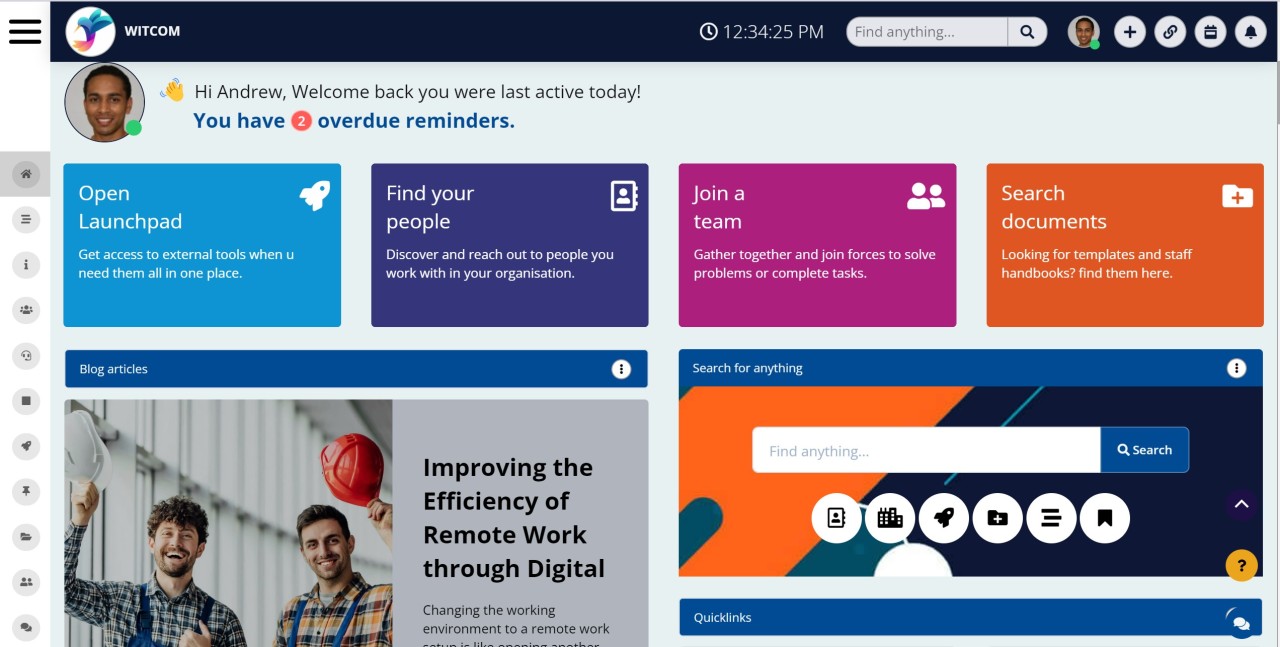
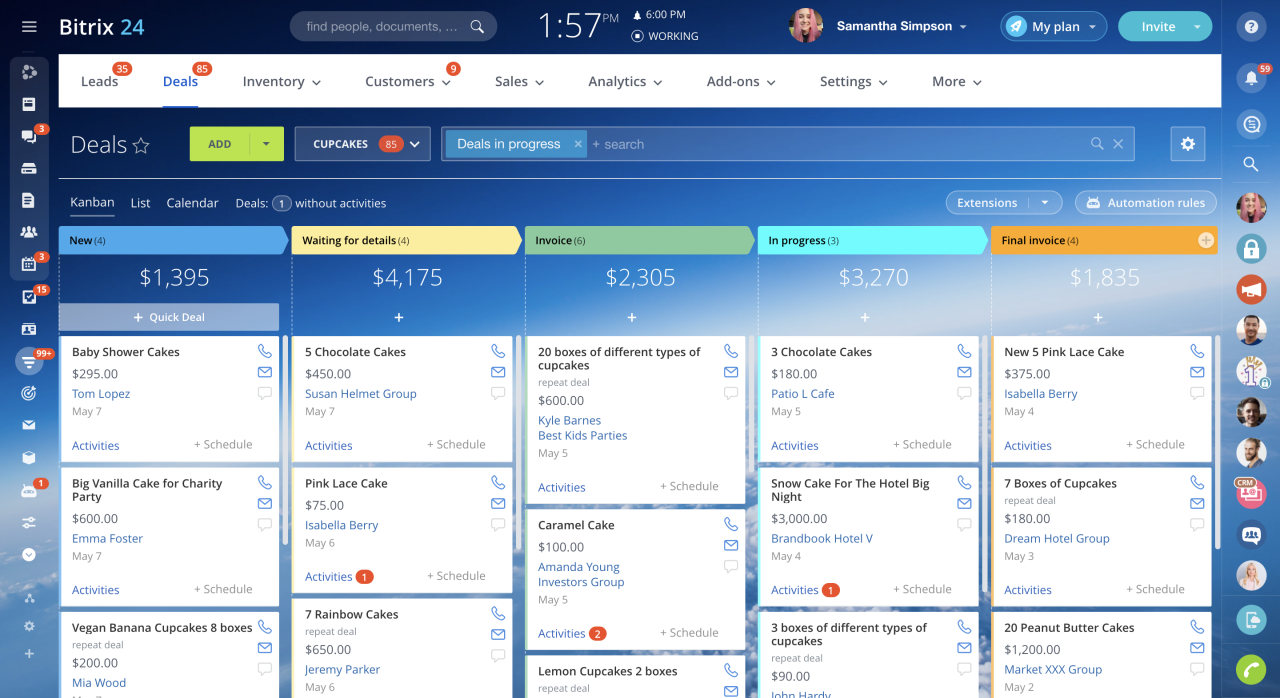
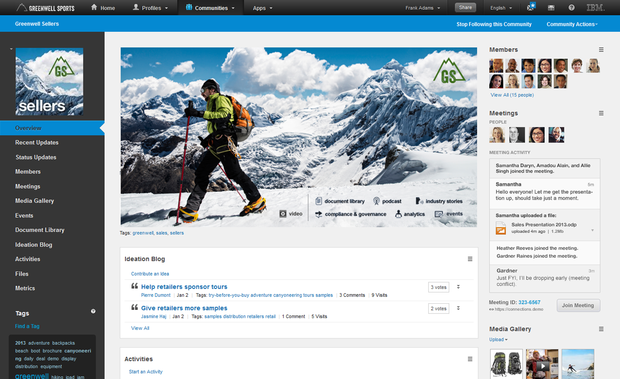
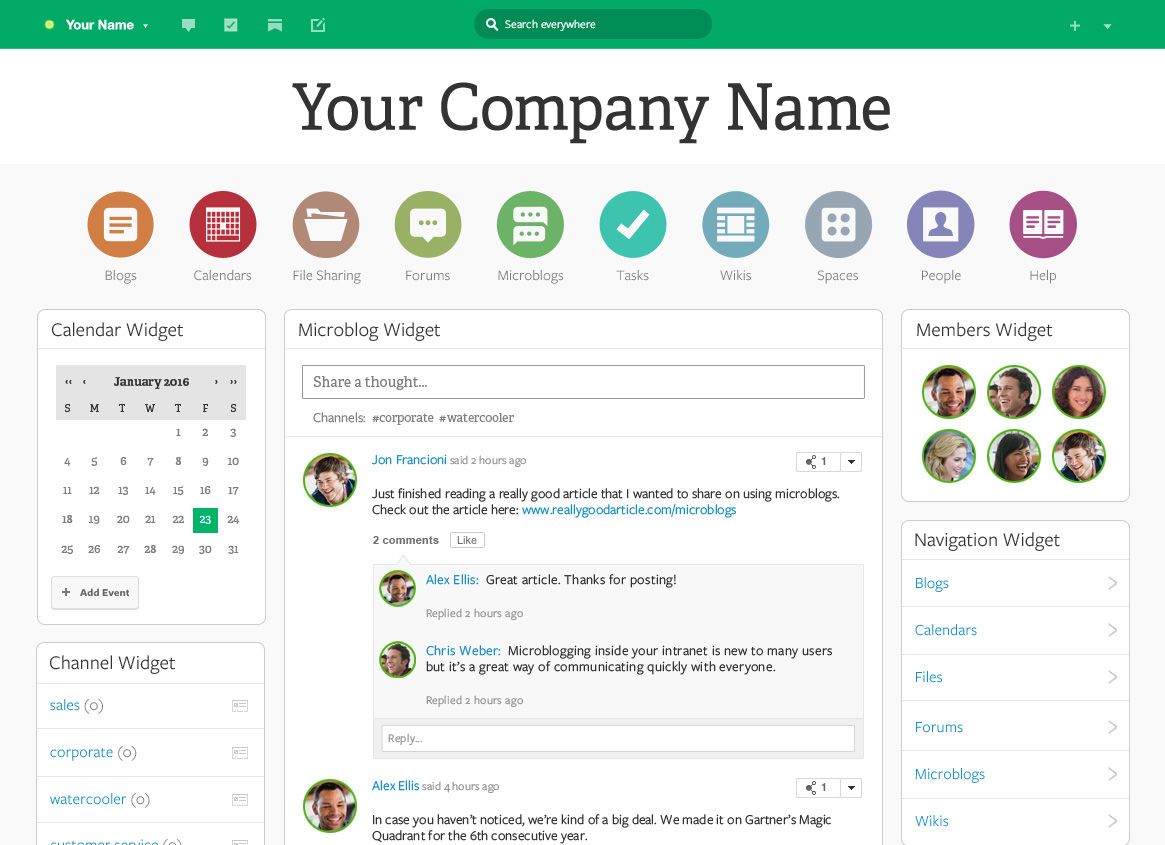
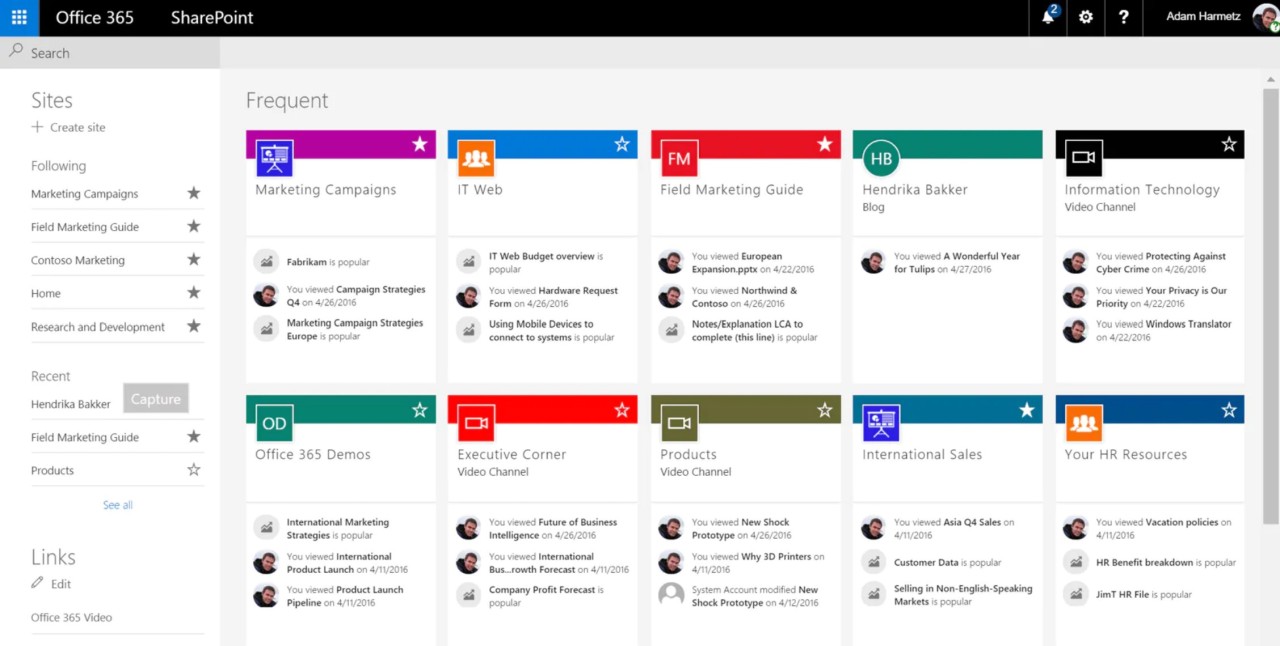
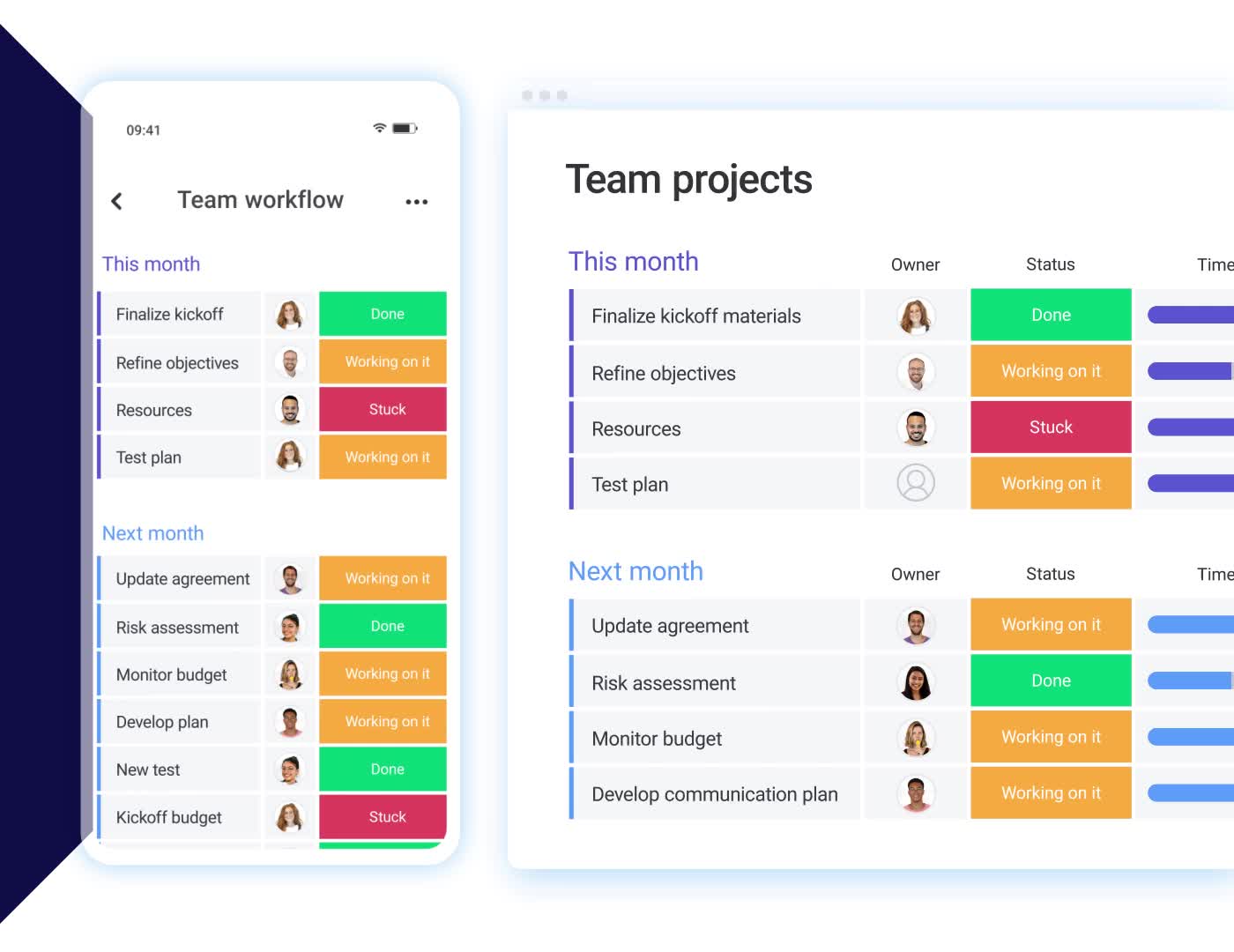







![What Is an Intranet for Business? [2026 Guide] What Is an Intranet for Business? [2026 Guide]](http://agilityportal.io/images/easyblog_articles/1496/b2ap3_thumbnail_What-Is-an-Intranet-for-Business.png)



